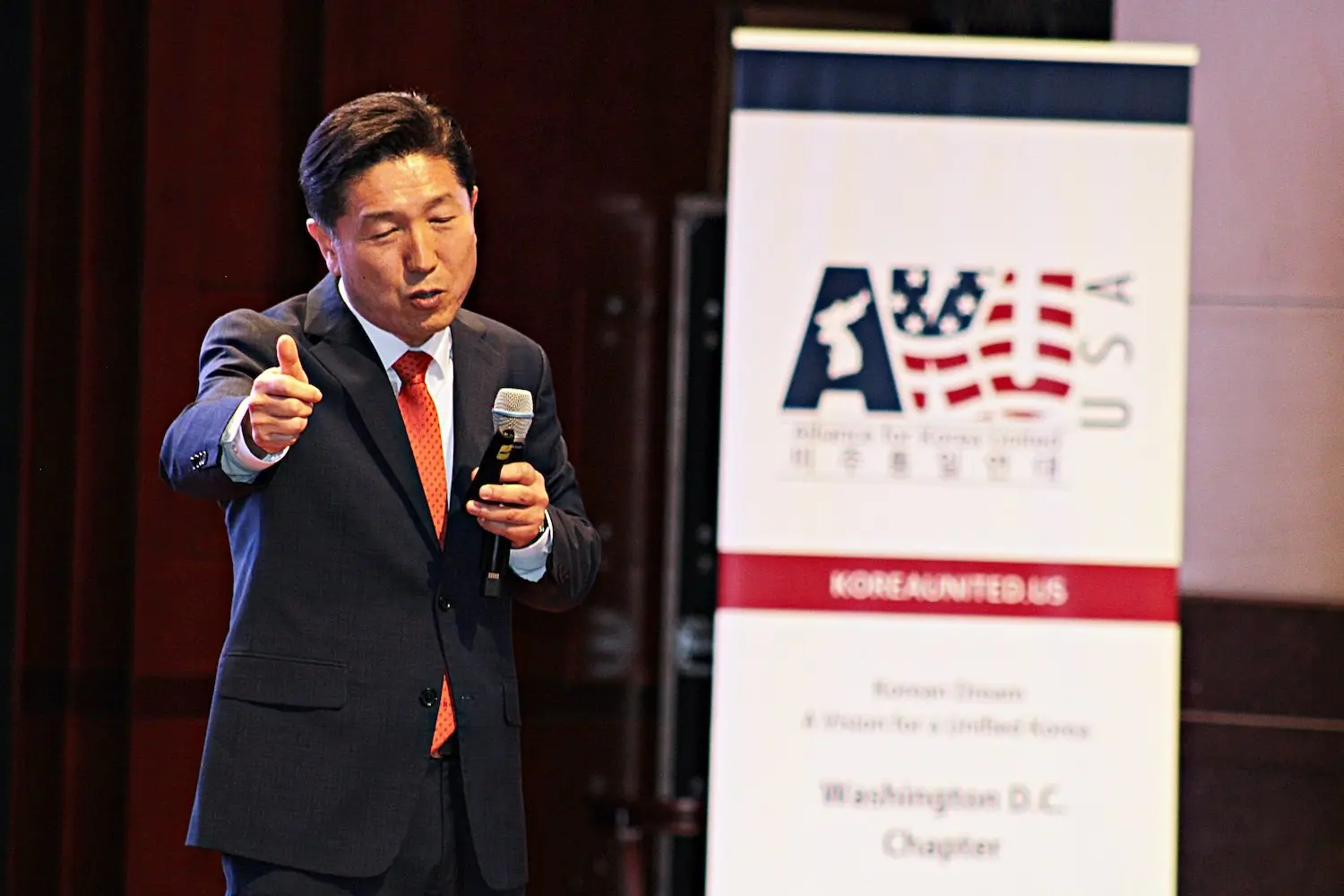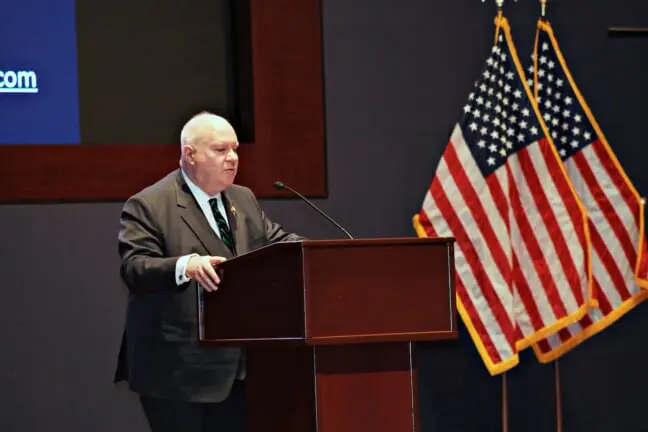Capitol Forum discusses the peaceful reunification of the Korean peninsula.
At the end of the Korean conflict that led to the division of the Korean peninsula into north and south, South Korea was the second poorest country in the world. But today, South Korea ranks as the 10th or 12th most developed country globally, said former Ambassador Morse Tan, during a recent forum marking 80 years of Korean liberation.
At the event marking 80 years of Korean liberation from Japanese colonial rule, speakers discussed and explored the current state of the relationship between the United States and the Republic of Korea against the background of the China-US quest for superiority, internal conflicts in both countries and regional tensions. Despite all of this, speakers emphasized the presence of myriad opportunities in the midst of crisis.
“South Korea has a free-market system and democracy. It saw massive economic development, has the highest number of college graduates and is fed by Christianity; it has 6 of the 10 biggest churches in the world,’ said Tan, former ambassador-at-large for Global Criminal Justice in the US State Department. “Meanwhile, North Korea is the poorest, most corrupt, evil country in the world … the whole country is like one big prison.”
Tan said the government has killed 15 million people, putting most in concentration camps “a la Hitler, Stalin and Mao,” where North Korean citizens endure torture, suffering and an unconscionable level of brutality and depravity.
Several speakers noted that the third-generation North Korean regime is on the verge of collapse despite its rationed economy, ideological control and a politics of fear.
Despite the deep political polarization, North Korea’s hostility towards its neighbor and both countries on the verge of war, several speakers at a Capitol Forum expressed their confidence that the vision of a free, peaceful, unified Korea is within reach.

Inteck Seo, chair of Action for Korea United, speaks at the Capitol Forum.
Inteck Seo, chair of Action for Korea United, declared that much like America’s Founding Fathers developing the framework that resulted in the Declaration of Independence, Koreans, likewise, need to begin their process of reunification with a vision and a set of principles they could unite around before delving into the actual nuts and bolts of reunited North and South Korea.
The Korean peninsula, Seo said, is at another inflection point in its history.
“What if we build a nation we’ve never had? North and South need each other. It’s vast resources and human labor versus efficiency and infrastructure,” Seo explained.
He elaborated on the Korean Dream, which is the vehicle that would power unification. Seo shared slides explaining the Korean Dream, which among its tenets includes a national community grounded in extended family culture; a moral free market system; the guarantee of a free press; an educational system that embraces and fosters ethics and morals; separation of church and state and freedom of religion.
“This is unification through the power of the world, people power using the bottom-up approach – inviting change through a citizens’ movement,” he said. “In my view, it will take 10 years to develop the new country …”
Using the examples of The Rev. Dr. Martin Luther King, Jr., Mahatma Gandhi and South Africa’s Nelson Mandela, Seo illustrated the tremendous potency of citizens’ movements and their ability as catalysts to produce profound political and socio-cultural changes. Seo also pointed to the unification of East and West Germany and the influence of the people in effecting that change.

Retired US Col. David Maxwell gives a presentation at the Capitol Forum.
Until that happens though, Retired US Col. David Maxwell and Dr. Suzanne Scholte offered their assessments of how the United States needs to counter North Korea’s ambitions.
Maxwell, vice president of the Center for Asia-Pacific Strategy and a senior fellow at the Global Peace Foundation, is arguing for unification first, denuclearization and then human rights.
“Peaceful unification is the most complex and difficult complete integration of two divergent cultures,” said Maxwell, who added that the hope is that new leadership emerges that seeks unification, regime transformation, peace and prosperity.
“There is no military solution to Korean unification. Unification is the only viable path. This unification will be military-supported and led by the Korean people.”
Maxwell, a former member of the US Special Forces who served in Korea, said the path to unification is through human rights. He also said denuclearization has failed after 40 decades, while arguing that unification is a viable path to denuclearization and regime transformation is the optimal path to reunification.
Going forward, he said the unification policy should be pursued by concentrating on human rights, a campaign to direct the flow of information into North Korea and what he characterized as “strategic strangulation of the Kim regime to counter illicit activities.”
Scholte, chair of the Defense Forum Foundation and the North Korea Freedom Coalition, spoke directly about how the organization of which she is a part of is subversively sending rice, radios, Bibles, rice bottles with freedom messages exposing the North Korean populace to the truth.
She said she works closely with North Korean defectors and “quietly delivers” packages to undisclosed locations.
She likened the job she and her colleagues are doing to the Underground Railroad that was prominent and active during the time that America held chattel slaves.
“Three million people have died from starvation, people are escaping for food and freedom. One hundred percent of refugees are imprisoned, tortured and executed in political prison camps,” Scholte said. “… And on this Underground Railroad,10,000 people have been freed by North Koreans, South Koreans, US and Chinese.”
Scholte, who is a part of Radio Free Korea, said the information campaign is critical because “once people are exposed to the truth, they will change.”
So far, she said, “Operation Truth” – which is funded 100 percent by donors – has delivered 3,600 kilograms of rice; 2,750 Bibles; 2,860 $1 bills; 50,000 pain relief tablets; 2,000 pens and 3,950 Ramen noodles packages.
Throughout their presentations, the speakers made it clear that their hostility towards the North Korean government does not extend to its citizens. And most were optimistic that reunification is possible despite many daunting challenges.
“We need to show affection to North Korea,” said Seo.
Tan concurred.
“I have hope there can be positives going forward. Reunification would provide a lot of solutions,” he said. “… We would make history to bring these two things back together. The Korean Dream is a historic opportunity.”
To sign your support for a Korean-led, free, peaceful and unified Korean Peninsula, visit the Korean Dream 10 Million Campaign and be among many globally to add their signature.

